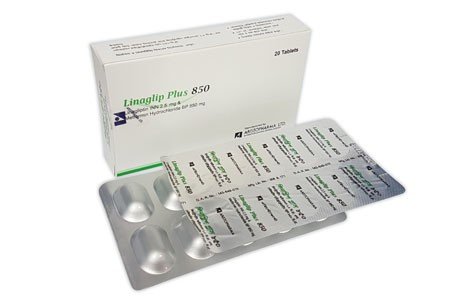
Type:10 Tablets
Generic Name:Linagliptin + Metformin Hydrochloride
Manufacturer:Aristopharma Limited
Price:৳140.00
Type 2 Diabetes mellitus
Should be taken with meals to reduce the gastrointestinal undesirable effects associated with metformin.
Indicated as an adjunct to diet and exercise to improve glycemic control in adults with type 2 diabetes mellitus when treatment with both linagliptin and metformin is appropriate. Prompt-release tablets Initial dose (not currently taking metformin): 2.5 mg/500 mg PO BID Initial dose (already taking metformin): Base dose on current metformin dose (eg, if taking metformin 1000 mg BID, initiate with 2.5 mg/1000 mg PO BID) Not to exceed 2.5 mg/1,000 mg BID Extended-release tablets Individualize dose on the basis of both effectiveness and tolerability, while not exceeding the maximum recommended total daily dose of linagliptin/metformin 5 mg/2000 mg Initial dose (not currently taking metformin): 5 mg/1000 mg PO qDay Initial dose (already taking metformin): 5 mg of linagliptin total daily dose and a similar total daily dose of metformin qDay Switch from prompt-release linagliptin/metformin: 5 mg of linagliptin total daily dose and a similar total daily dose of metformin qDay Hepatic impairment: Not recommended because of increased risk of lactic acidosis
<18 years: Safety and efficacy not established
Renal impairment Obtain eGFR before starting metformin eGFR <30 mL/min/1.73 m²: Contraindicated eGFR 30-45 mL/min/1.73 m²: Not recommended to initiate treatment Monitor eGFR at least annually or more often for those at risk for renal impairment (eg, elderly) If eGFR falls below 45mL/min/1.73 m² while taking metformin, risks and benefits of continuing therapy should be evaluated If eGFR falls below 30 mL/min/1.73 m²: while taking metformin, discontinue the drug
Hypersensitivity. Type 1 diabetes, diabetic ketoacidosis or pre-coma, renal failure or dysfunction (CrCl <60 mL/min), hepatic insufficiency, acute alcohol intoxication, alcoholism. Acute conditions w/ the potential to alter renal function eg dehydration, severe infection, shock, IV administration of iodinated contrast agents. Acute or chronic diseases which may cause tissue hypoxia eg cardiac or resp failure, recent MI. Lactation.
Linagliptin: Dipeptidyl peptidase 4 (DPP-4) inhibitor; increases and prolongs incretin hormone activity from glucagon-like peptide-1 (GLP-1) and glucose-dependent insulinotropic polypeptide (GIP) which are inactivated by the DPP-4 enzyme; incretins increase insulin release and reduce glucagon secretion Metformin: Decreases hepatic glucose production; decreases GI intestinal glucose absorption; increases target cell insulin sensitivity; lowers both basal and postprandial plasma glucose and unlike sulfonylureas, does not typically produce hypoglycemia or hyperinsulinemia
Monitor for pancreatitis, hypoglycaemia, lactic acidosis, renal impairment. Intravascular administration of iodinated contrast agents. Co-administration of insulin. Discontinue treatment 48 hr before elective surgery w/ general, spinal or peridural anaesth. Evaluate serum electrolytes & ketones, blood glucose & if indicated, blood pH, lactate, pyruvate & metformin levels in patients w/ previously well controlled type 2 diabetes on Trajenta Duo who develops laboratory abnormalities or clinical illness. Pregnancy. Childn & adolescents <18 yr. Elderly. Lactation: Metformin excreted in human milk in low concentrations; unknown if linagliptin excreted in human milk No studies in lactating animals have been conducted with the combined components; because the potential for hypoglycemia in nursing infants may exist, a decision should be made whether to discontinue nursing or to discontinue the drug, taking into account the importance of the drug to the mother
>10% Hypoglycemia (with sulfonylurea) (22.9%) 1-10% Nasopharyngitis (6.3%),Diarrhea (6.3%),Hypoglycemia (without sulfonylurea) (1.4%) Frequency Not Defined Hypersensitivity (eg, urticaria, angioedema, or bronchial hyperactivity),Cough,Decreased appetite,Nausea,Vomiting,Pruritus,Pancreatitis
Linagliptin: Inhibits P-glycoprotein-mediated transport of digoxin (w/ low potency). Increased AUC & Cmax w/ ritonavir. Decreased steady-state AUC & Cmax, & DPP-4 inhibition at trough w/ rifampicin. Weakly inhibits CYP3A4-mediated metabolism (eg simvastatin). Metformin: Increased risk of lactic acidosis in acute alcohol intoxication. Competition on common renal tubular transport systems w/ cationic agents eliminated by renal tubular secretion (eg cimetidine). Risk of renal failure & lactic acidosis w/ intravascular administration of iodinated contrast agents.